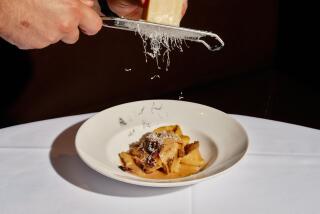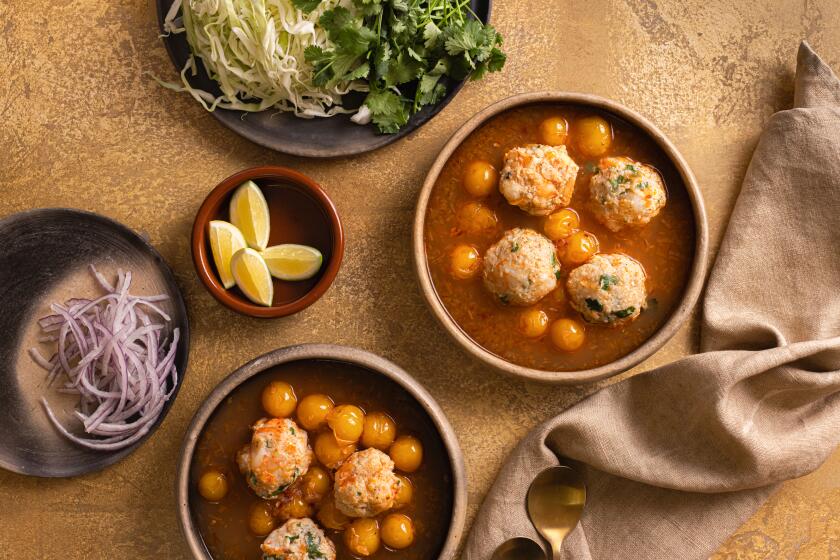Wines robust in black pride
When Selena Cuffe sampled South African wines four years ago in Soweto, she didn’t wax poetic about their rustic radiance, about plum and berry notes on the nose or hints of vanilla on the palate. That would come with time.
What swept her off her feet were the stories behind the labels: black winemakers struggling to survive, post-apartheid, in an industry dominated by whites and in a market suspicious of new players.
“It was like a bright light went off in my head,” said Cuffe, a high-energy 33-year-old with a Harvard MBA, marketing experience at Proctor & Gamble Co. and a desire, as an African American, to give a hand to black entrepreneurs in South Africa.
“I thought: Someone needs to tell these stories . . . and why not us? This is democracy playing itself out, a transformation in real time.”
Cuffe called her husband, Khary, who was working on his MBA back home in Boston. “He’s the eternal . . . I won’t say pessimist, but realist,” she said. Khary agreed it sounded interesting, but warned “we’ve got to crunch the numbers.”
A month later, in October 2005, they launched Heritage Link Brands, the only U.S. company dedicated to importing and distributing wines produced by black South Africans.
They invested $70,000, most of it from savings, and borrowed the rest against their credit cards, at promotional rates. One of their first major decisions was to put the headquarters in Los Angeles, Selena’s hometown.
Today, wines imported by Heritage Link are sold at 835 restaurants, retailers and grocery stores, including Albertsons in Southern California, and are being poured in the business and first-class cabins of United Airlines and, soon, American Airlines. Total revenue rose to more than $1 million last year from a little less than $100,000 in 2007, and it’s up 50% this year.
“Our objective has always been to make the wines and the stories behind them household names,” said Selena, the company president, “and to change people’s perceptions of Africa by exposing them to all that’s beautiful coming from the continent.”
Heritage Link Brands has a small stable of South African wines made by indigenous vintners, and each represents a chapter in the story of black empowerment.
The Seven Sisters wines, for example, are produced by sisters who, during apartheid, were evicted from their home in a small fishing village on the western coast of South Africa. They returned 22 years later and now produce seven wines, each named for one of the sisters.
The Bouwland Cabernet Sauvignon-merlot blend comes from a winery that is owned and run by a group of farmworkers who banded together after apartheid and, with the help of a white winemaker, bought a prime 140-acre vineyard near Stellenbosch.
The M’hudi wines come from another Stellenbosch vineyard -- the only black, family-owned vineyard in South Africa. Diale Rangaka, a former English professor, and his wife, Malmsey, a clinical psychologist, had long dreamed of owning a farm, but it wasn’t possible under apartheid. They bought the property in 2003 and moved there from Soweto.
Heritage recently expanded its product line to include wines made elsewhere by people of African descent. It distributes a Mendocino County chardonnay produced for Divas Uncorked, founded by 10 African American women drawn together by a love of wine and a frustration with vintners and sommeliers who overlooked women and black customers. And it imports Passages, a chardonnay produced in Stellenbosch by two African Americans.
The Cuffes are counting on shoppers being drawn to those stories and willing to pay $13 to $20 for a bottle of wine.
“We provide an affordable luxury that not only tastes good but inspires people,” Selena said.
Sales of wines priced at more than $15 have suffered during the recession, but less-expensive wines have done well, industry analysts say. It’s less clear whether wines aimed at socially conscious consumers can command a premium.
In a research project for a would-be Heritage competitor last spring, UC Davis students concluded that American consumers weren’t willing to pay extra for wines produced by blacks in South Africa.
“That’s a niche market, but it’s not sufficient to sell very much wine at a premium,” said their professor, Robert Smiley, who is director of wine industry studies in the graduate management school. “By and large, the wine has to stand on its own two feet as far as quality goes. If it’s good and priced right, it will sell.”
The Cuffes’ venture has its own back story of obstacles overcome with determination, the good advice of high-powered mentors and, no surprise, luck.
When the couple weighed whether to take the plunge in 2005, they had access to a sounding board that any budding entrepreneur would envy: the faculty of the Harvard Business School. Selena had graduated two years earlier and Khary was finishing his MBA.
“We were in the right place at the right time to get the information we needed quickly,” Selena said. “Within a month, all the arrows pointed toward go.”
The Cuffes also had corporate experience. Selena, who grew up in Ladera Heights and graduated from Stanford, had worked for United Airlines and Proctor & Gamble. Khary, a New Yorker, today works for Proctor & Gamble.
Selena spent the first year of the couple’s venture conducting blind tastings that identified the wines to represent, pitching them to major retailers and juggling credit card debt.
“While most of my girlfriends were using credit cards to buy Gucci and Prada, we were using it to cover marketing and inventory,” Selena said. “It’s a good thing that I hate shopping.”
The low point came at the end of 2007, when disappointing revenue prompted a discussion about the viability of the enterprise. As she recalled it, Khary said: “Sweetie, I’m not going to lie to you. We need a sign from God in the next quarter that this is the path that we’re supposed to be on. Otherwise, you’re going to have to go back and work for P&G.;”
They got a sign a few months later, when Heritage landed a contract with United Airlines, which bought 10,000 cases. By the middle of 2008, it was clear that Selena would be spared a return to the corporate world.
Today, she heads a staff of 15. Heritage’s Los Angeles office shares a lobby with Selena’s sister, a tax and real estate advisor. The company rents warehouses in Northern California and New York state. Selena works from her home in a Cincinnati suburb, where she and Khary live with their two toddlers.
As the company has grown, Selena’s view of who qualifies as a partner in South Africa has changed. At first, she wanted to represent only wines made by operations owned and run by black South Africans.
“I was hung up on the idea of making sure that everyone involved was black, because this is a $3-billion industry in South Africa and less than 2% of it is owned by the black majority population,” Selena recalled. “But that was silly.”
Color, she added, doesn’t matter as long as the wine maker is creating wealth for the black majority. “I want to do business with people whose hearts are in the right place,” she said.
More to Read
Eat your way across L.A.
Get our weekly Tasting Notes newsletter for reviews, news and more.
You may occasionally receive promotional content from the Los Angeles Times.







